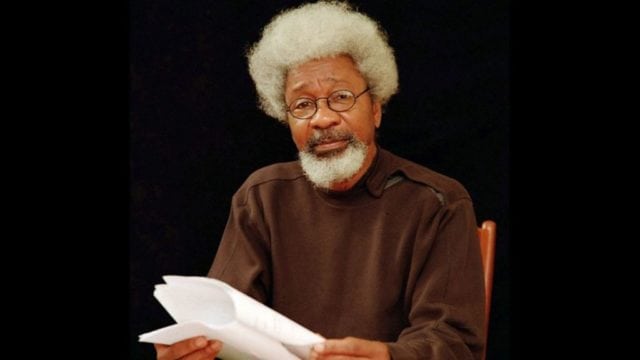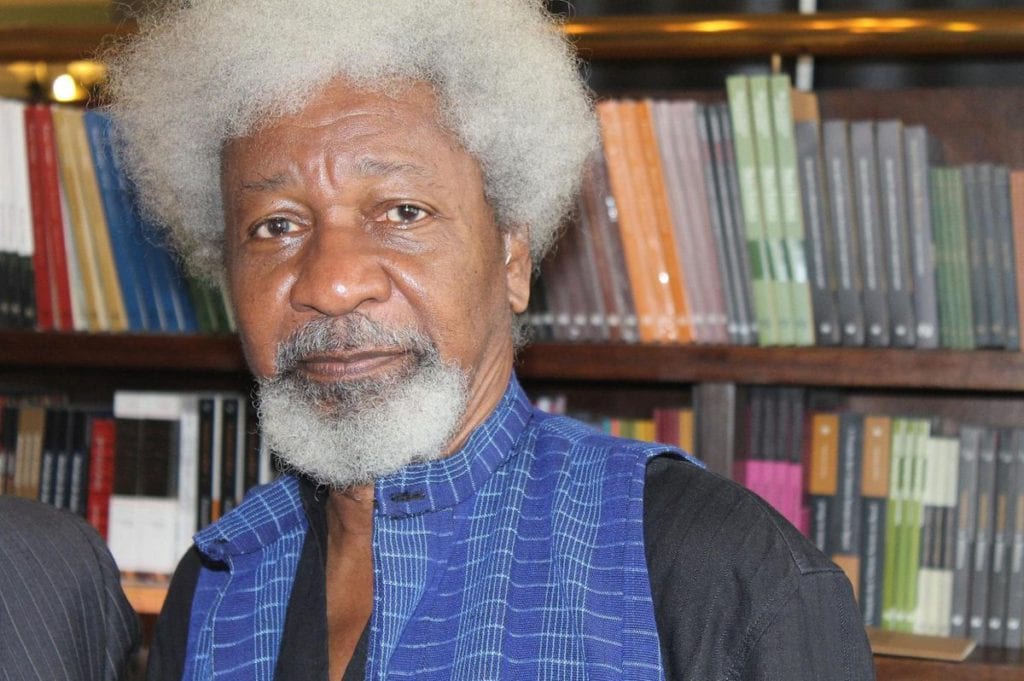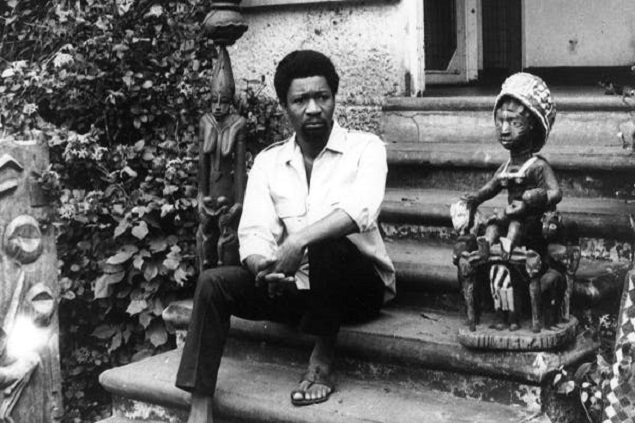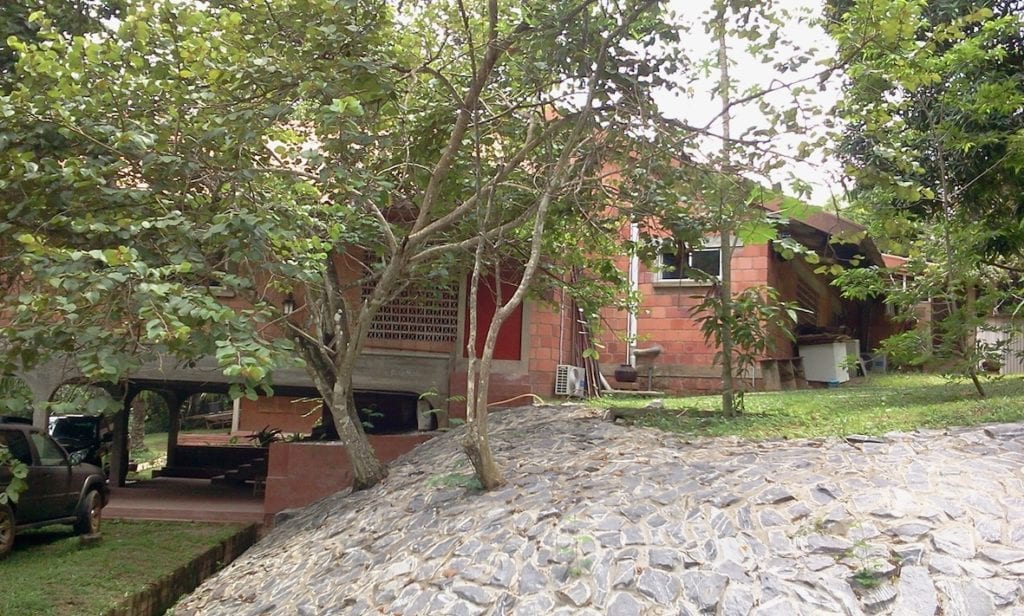Wole Soyinka, also known as Akinwande Oluwole Babatunde Soyinka, is a famous Nigerian playwright, poet, novelist, activist, and essayist. He received the award for the Nobel Prize in Literature in 1986 and was the first sub-Saharan African to receive such honour.
He is successful in what he does and while most writers struggle to make a comfortable living from their work, a lucky handful have made a fortune off their literary talents. Professor Wole Soyinka, whose net worth is estimated at $20 million, is definitely among the handful who have been able to raise their financial stance through their widely-acclaimed works of literature.
In a continent as ethnically and culturally diverse as Africa, it comes as no surprise that the literature that has emerged from it be equally diverse and multifaceted. Soyinka is one of those who, through their works, were able to re-write the African story in a way that it becomes meaningful in the world. His extensive insights on political matters in Nigeria have also garnered him accolades and praise over the years.
Summary of Wole Soyinka’s Biography
- Name in Full: Akinwande Oluwole Babatunde Soyinka
- Also known as: Wole Soyinka
- Date of Birth: July 13, 1934
- Age: 89 years old
- Place of Birth: Abẹokuta, Ogun State,
- Nationality: Nigerian
- Profession: Playwright, Novelist, Poet, and Essayist
- Active Years: 1957–present
Life History Of Wole Soyinka
How Old is Wole Soyinka and Where Was She Born?
Akinwande Oluwole Babatunde Soyinka is a Nigerian playwright, author, poet, teacher, and political activist. He was born on July 13, 1934, at Abeokuta, near Ibadan in western Nigeria. Wole’s father, Samuel Ayodele Soyinka, was a prominent Anglican minister and headmaster, while his mother, Grace Eniola Soyinka, was a shopkeeper and local activist.
As a descendant of the rulers of Isara, Soyinka, who is currently 89 years old, grew up in a large family with seven children. He was the second child born to his parents, and his siblings were Atinuke “Tinu” Aina Soyinka, Femi Soyinka, Yeside Soyinka, Omofolabo “Folabo” Ajayi-Soyinka, and Kayode Soyinka. Sadly, his younger sister Folashade Soyinka died on her first birthday.
Soyinka also has large family relatives who are influential in Nigerian society. Through his mother, who was the granddaughter of Rev. Canon J. J. Ransome-Kuti, he became a member of the influential Ransome-Kuti family, with the likes of Fela Kuti, Beko Ransome-Kuti, Olikoye Ransome-Kuti, and Yemisi Ransome-Kuti becoming his first cousins. His second cousins would include musicians Femi Kuti, Seun Kuti, and dancer Yeni Kuti. As a child, he lived in an Anglican mission compound, learning the Christian teachings of his parents, the Yoruba spiritualism, and the tribal customs of his grandfather.
Wole Soyinka’s Education Was Completed in Nigeria
Growing up in a family with so much influence and a father who was a headmaster, it is therefore not surprising how Wole Soyinka gained early education in a time when education was a luxury only a few wealthy families could afford. He started with St. Peter’s Primary School in Abeokuta, where his father was the headmaster. After that, he moved to Abeokuta Grammar School, which was often called the first grammar school in Nigeria.
The school, founded in 1908, is also associated with notable figures from Nigerian politics and the arts, including the teacher and political activist Funmilayo Ransome-Kuti, and her son, the musician Fela Anikulapo-Kuti. Soyinka’s study at Abeokuta grammar school was brief as he gained admission at Government College in Ibadan in 1946. After completing his six-year career at the college, he automatically gained admission at University College Ibadan, affiliated with the University of London.
At the University college, Soyinka studied English literature, Greek, and Western History. It was at the University college that he wrote one of his note-worthy pieces – “Keffi’s Birthday Treat,” a short radio play aired on the Nigerian Broadcasting Service in July 1954. The School also became a founding ground for the Pyrates Confraternity, an anti-corruption and justice-seeking student organization. He founded the confraternity alongside six others, and it became the first confraternity in Nigeria.
He Left Nigeria to Continue His Education in England in 1954
The year 1954 saw Wole Soyinka leaving the shores of his home country to England to continue his education at the University of Leeds. The University served as a budding ground for young Soyinka, who has grown a strong passion for literature. Before graduating with a bachelor’s degree in English Literature in 1958, he was exposed to more young notable writers of British descent. He finished his first degree bagging a second-class Upper certificate.
He immediately began his master’s program at the University while writing plays drawing on his Yorùbá heritage. In 1973, he was given Honoris Causa doctorate by the University of Leeds. During his time in England, Soyinka was a dramaturgist at the Royal Court Theatre in London. He was awarded a Rockefeller bursary and returned to Nigeria to study African drama. On his return to Nigeria, he taught drama and literature at various universities in Ibadan, Lagos, and Ife, where, since 1975, he has been a professor of comparative literature.
In 1960, he founded the theatre group called “The 1960 Masks,” and in 1964, the “Orisun Theatre Company,” through which he produced his plays and took part as an actor. He has periodically been a visiting professor at the universities of Cambridge, Sheffield, and Yale.
Summary of Wole Soyinka’s Educational Qualification
- Primary Education at St. Peter’s Primary School in Abeokuta
- Two years of Secondary education at Abeokuta Grammar School
- Two years secondary education at Government College (1946-1952)
- Studied English literature, Greek, and Western history at the University College Ibadan (1952–1954)
- BA English and Literature at the University of Leeds (1954-1958)
- Honoris Causa doctorate by the University of Leeds (1973)
Wole Soyinka’s Books and Literature Works
Prof. Wole Soyinka has published hundreds of works. As one of the greatest writers of his generation, he produced plays, novels, poems, and essays that explore African art and worldviews and serve as witnesses to sociopolitical issues in the world. He writes in English, and his literary language, which is marked by great scope and richness of words, is rooted in his native Nigeria and the Yoruba culture, with its legends, tales, and traditions. His writing often focuses on oppression and exploitation of the weak by the strong. None are spared in his critique, neither the white speculator nor the black exploiter. In 64 Years, Soyinka wrote 52 books comprising drama, poems, novels, and a lot more.
His Career As a Playwright
Wole Soyinka is said to be heavily influenced by the Irish writer J.M. Synge, among many others. He links up with the traditional popular African theatre, combined with dance, music, and acting. As a dramatist, he bases his writing on the mythology of his own tribe-the Yoruba-with Ogun, the god of iron and war, at the center. He wrote his first plays, The Swamp Dwellers and The Lion and the Jewel (a light comedy), in London, and they were performed in Ibadan. The Lion and the Jewel, which later became one of his best-known plays, has its setting in Ilujinle, a Yoruba village with Baraka and Sidi as the titular “lion” and “jewel.”
His later satirical comedies include The Trial of Brother Jero, with its sequel, Jero’s Metamorphosis, A Dance of the Forests, among many others. His serious philosophic plays are The Strong Breed, The Road and Death, and the King’s Horseman. His The Bacchae of Euripides was written in 1969 and first performed on August 2, 1973. In Opera Wonyosi, a farcical political read that tells of the poverty, corruption, and other vices present in the country, was first performed on October 16, 1977. Soyinka’s latest dramatic works are A Play of Giants and Requiem for a Futurologist.
Complete list of Woke Soyinka’s plays
- Keffi’s Birthday Treat (1954)
- The Invention (1957)
- The Swamp Dwellers (1958)
- A Quality of Violence (1959)
- The Lion and the Jewel (1959)
- The Trials of Brother Jero (1960)
- A Dance of the Forests (1960)
- My Father’s Burden (1960)
- The Strong Breed (1964)
- Before the Blackout (1964)
- Kongi’s Harvest (1964)
- The Road (1965)
- Madmen and Specialists (1970)
- The Bacchae of Euripides (1973)
- Camwood on the Leaves (1973)
- Jero’s Metamorphosis (1973)
- Death and the King’s Horseman (1975)
- Opera Wonyosi (1977)
- Requiem for a Futurologist (1983)
- A Play of Giants (1984)
- Childe Internationale (1987)[97][98]
- From Zia with Love (1992)
- The Detainee (radio play)
- A Scourge of Hyacinths (radio play)
- The Beatification of Area Boy (1996)
- Document of Identity (radio play, 1999)
- King Baabu (2001)
- Etiki Revu Wetin
- Alapata Apata (2011)
- “Thus Spake Orunmila” (short piece; in Sixty-Six Books (2011)
Wole Soyinka is Also a Poet
As a poet, Professor Wole Soyinka creates verses that are lyrical, visual, and often filled with African myth and ritual. Soyinka’s poems, which show a close connection to his plays, are collected in Idanre. His first poetry collection was released in 1969. The collection earlier titled ‘Poems from Prison‘ and later renamed A Big Airplane Crashed Into The Earth’ was penned months after his release from prison, at the end of the civil war in Nigeria.
A Shuttle in the Crypt, Soyinka’s second poetry collection, was produced in 1971, and like his first, it was inspired by his 22-months imprisonment during the Nigerian Civil War. The collection also explores his inner mind as it shuttles between life to death, fuelled by the fear of death. Meanwhile, some of the poet’s best poems include “Civilian and Soldier,” “Dedication,” “Dedication From Moremi,” “I think it rains,” “In the Small Hours,” “Night,” “Procession I – Hanging day,” “Telephone Conversation.”
Wole Soyinka’s Poetry Collections
- Telephone Conversation (1963) (appeared in Modern Poetry in Africa)
- Idanre and other poems (1967)
- A Big Airplane Crashed into The Earth(original title Poems from Prison) (1969)
- A Shuttle in the Crypt (1971)
- Ogun Abibiman (1976)
- Mandela’s Earth and other poems(1988)
- Early Poems (1997)
- Samarkand and Other Markets I Have Known (2002)
He Has Written Three Novels
Soyinka was known to have written two novels, The Interpreters and Season of Anomy. While The Interpreters spotlights a small circle of young Nigerian intellectuals living in Lagos, Season of Anomy tells the story of an individual selling a utopian world out to spread its ideas. After almost 50 years of his career as a writer, Soyinka released Chronicles from the Land of the Happiest People on Earth.
The book, which Soyinka dedicated to Nigeria, was published in September 2021. Dubbed a whistleblower’s book, it tells the multidimensional story of a secret society that deals in human parts for sacrificial uses, whose members encompass the highest political and religious figures in the land. It bought to bare the realities of present-day Nigeria. Aside from his novels, Soyinka’s Literary essays are collected in Myth, Literature and the African World (1975).
List of Wole Soyinka’s Novels
- The Interpreters (1965)
- Season of Anomy (1973)
- Chronicles from the Land of the Happiest People on Earth (2021)
Besides Writing, Soyinka is Also a Political Activist
Prof Wole Soyinka was awarded the Nobel Prize for Literature in 1986. His Nobel acceptance speech, “This Past Must Address Its Present,” was devoted to South African freedom-fighter Nelson Mandela. Soyinka’s speech was an outspoken criticism of apartheid and the politics of racial segregation imposed on the majority by the Nationalist South African government.
During the civil war in Nigeria, Soyinka appealed in an article for a cease-fire. For this, he was arrested, accused of conspiring with the Biafran rebels, and was held as a political prisoner for 22 months. Now considered Nigeria’s foremost man of letters, Wole Soyinka is still politically active and spent the 2015 election day in Africa’s biggest democracy working the phones to monitor reports of voting irregularities, technical issues, and violence.
After the election on March 28, 2015, he said that Nigerians must show a Nelson Mandela–likeability to forgive president-elect Muhammadu Buhari‘s past as an iron-fisted military ruler. However, recent years have seen the Nobel Laureate tackling Mohammadu Buhari’s government for sensitive issues affecting the country. At some point, he insinuated that the Buhari government be treated like it never existed for one’s sense of balance.
How Wole Soyinka’s Net Worth of $20 Million Accrued
While penning a good tale is one way to get rich, it certainly isn’t the only path to the top. A typical book author barely makes more than minimum wage. You merely hit your way to the rich list when your book sells thousands of copies, and then you receive royalties on net profit from each book. Some of the wealthiest authors of all time juggled their writing careers with some other profit-related commitments. As for Professor Soyinka, his books, literature essays, research works, and classroom teachings have helped him build the $20 million net worth he currently enjoys. Let’s look at how he made such a huge wealth below.
His Books and Literature Works
Soyinka has long been a passionate playwright. He began earning from his plays from his college years. One of his early incomes came from his work on “Keffi’s Birthday Treat,” a short radio play for Nigerian Broadcasting Service. He began to earn more for himself while at the Unversity of Leeds, where he published and worked as an editor for a satirical magazine called The Eagle. Much more came from his theatrical works like The Lion and the Jewel and The Invention.
However, the Rockefeller Research Fellowship from University College in Ibadan brought a new financial turnaround for the writer who could buy himself a Land Rover from the grant. As one of the best-selling book authors, Soyinka has his books published and sold on Amazon and other bookselling points, where he makes a substantial amount of money. However, his exact earnings from his book and literature works have not been disclosed.
His teaching Career
Soyinka has been a Professor of Creative Writing at the University of Nevada, Las Vegas, and has served as scholar-in-residence at NYU’s Institute of African American Affairs and Loyola Marymount University in Los Angeles, California. He also taught at the universities of Oxford, Harvard, Yale, and Cornell University. Back home in Nigeria, he taught at the Department of English Language at Obafemi Awolowo University in Ifẹ. Soyinka was also a Distinguished Scholar in Residence at Duke University in 2008. Although it is not clear how much he made from all these notable institutions, there is no doubt they contributed to building his current financial stance.
A Sneak Peek Into Wole Soyinka’s House
Of all places, one will think a man of Professor Wole Soyinka’s status to own a home; it will be one built in the middle of a forest. However, that is not always a likely guess. His house is located in a thick forest in Abeokuta, Ogun State. However, the home is an ancient architectural masterpiece to behold. The main building is a red-brick house, which nestles atop a hill with a tiny river flowing below and giant trees towering above.
The building also has an amphitheater for drama rehearsals and performances. It also has a shooting range that provides a bird’s eye view of a section of the path that leads to the house, hidden reading rooms (there are reading spaces everywhere), and a special prayer room for Christians, Muslims, and traditionalists. To Soyinka, there is room for all religions to co-exist.
Notable Awards Won By Professor Wole Soyinka
Soyinka has severally been recognized for his academic contributions and criticism of any form of social injustice. One of his foremost awards received was the Nobel Prize in Literature in 1986. Upon receiving this award, he became the first sub-Saharan African to be honored in that category. However, before then, he received the Anisfield-Wolf Book Award for Lifetime Achievement in 1853.
In December 2017, he was awarded the Europe Theatre Prize in the “Special Prize” category. This award is given to someone who has “contributed to the realization of cultural events that promote understanding and the exchange of knowledge between peoples.” Other notable accolades received by Professor Wole Soyinka include the Benson Medal from the Royal Society of Literature in 1990 and an Academy of Achievement Golden Plate Award in 2009.
- 1983: Anisfield-Wolf Book Award, United States
- 1986: Agip Prize for Literature
- 1986: Commander of the Order of the Federal Republic (CFR).
- 2005: Conferred with the chieftaincy title of the Akinlatun of Egbaland by the Oba Alake of the Egba clan of Yorubaland.
- 2013: Anisfield-Wolf Book Award, Lifetime Achievement, United States
- 2014: International Humanist Award



